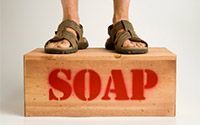94 comments Add a comment
Why PEOPLE WHO STARE at my autistic child like he's a purple alien from Planet Zarg? Didn't your parents teach you any manners? We know he is odd, and we know he can be noisy - but if he were in a wheelchair you'd give him no more than a quick glance, would you?
Don't be afraid - if you want to know about him, just ask!
My son Eben has what most doctors would call 'moderate to severe' autism and learning difficulties to match; I would liken his general demeanour to a seven year old body with a very happy hyperactive four year old inside it! Contrary to the oft-perceived stereotype he is outgoing, affectionate, chatty and loves meeting new people and going to new places. He lost his hard won verbal skills at the age of four and now can't form words - but that doesn't stop him trying! And he understands you perfectly if you keep things simple. He is possibly the happiest little boy I have ever met and has a dimpled smile that makes everyone say "aaah". So why, when we go out, do people insist on staring?
Admittedly, diving into a fountain fully clothed (because you think the mosaic tiles on the bottom make it look like a swimming pool) may attract a little attention. As might stripping off in public, or obsessively sitting on drain covers, or licking railings. Even I find these odd, but such behaviour certainly brightens the day (assuming there is a change of clothing to hand and the car is parked nearby).
The question I am asked most often is, does he have a special talent? Well, no unless you count eating a full plate of pasta in under 30 seconds, or utter fearlessness of anything except small fluffy animals. When motivated (i.e. hes spotted someone with ice cream) he can sprint with astounding speed, but we are yet to harness this for any purpose, (or indeed in a straight line). Likewise, he is adept at chewing to pieces anything softer than reinforced concrete but this is only likely to prove useful in the event he needs to escape from a bed that has been tucked too tight.
 He loves cuddles and touching faces, and giggles when he knows he is being cheeky (which is surprisingly often). His best habit is making us laugh, and his worst eating sand. Beneath the autism he is a delightful, fascinating little boy who is adored by everyone who knows him.
He loves cuddles and touching faces, and giggles when he knows he is being cheeky (which is surprisingly often). His best habit is making us laugh, and his worst eating sand. Beneath the autism he is a delightful, fascinating little boy who is adored by everyone who knows him.
Parents of special needs children are delighted when someone asks about their child, because it is a chance to tell someone more than books ever can. This is especially true of parents of autistic children. We have all spent days dissolved in tears, but have spent many more being thankful our child is who and what they are and not what we once wished they could be. The media quite rightly talks about the hardships of being a parent or carer, but it forgets about the pleasures. Its a clich to say being with a special child is difficult but incredibly rewarding - but its true! We dont want you to think, Oh that poor woman, how does she cope? Thank goodness thats not me. We want you to think, Is her son autistic? I wonder what his name is.
If you are curious enough to stare you are curious enough to ask; come and say hello! I know that approaching a special child can be scary youre not sure what to say or whether to talk directly to the child or to their carer. So Ill help you.
Always speak to the child first. Their understanding is almost certainly better than their reciprocal communication. If the child cant (or wont) respond the carer will do so for them youre spared any embarrassment and may well come away having learned something.
What would be embarrassing is to be caught staring!
By: Attila the Mum
Leave a comment
As for your point about paragraphs - well, "yes", I agree. I will try and get into the habit of using them on this forum (I do normally).
"Terri, bless you!"
Why, did you think I sneezed?
I understand what you are saying about behaviour but you still have not answered my question. If someone looks or behaves differently to the usual, do you stare at them?
"All behaviour that goes beyond the 'norm', that is, all behaviour that demands the attention of otherwise disinterested strangers, will lead to an element of 'staring'."
This is a circular argument and a lot depends on what you regard as "the norm".
Do you stare if you see a person with a guide dog to watch how they work? A lot of people do. Do you stare at people using sign language or someone deafblind using "hands on" sign language. If you have never encountered this, would you feel that their behaviour warranted a stare if you did see someone doing this?
I actually have a lot of sympathy for your wanting to have your coffee in relative peace. I feel the same way, but in my experience it is the parents of so called "normal" children who let their charges run riot around coffee shops and not the parents of disabled or learning disabled children.
Can you answer the question asked..Why do you think you have a right to stare at autistic children?
Disabled children and adults have to function to the best of their ability in a society in which they are seldom welcomed these days. You criticise autistic kids for what you see as "impolite behaviour" which interferes with your ability to read your paper in Costa.
Instead of giving them hostile, self righteous stares, you should appreciate the enormous efforts and bravery of both their parents and the kids themselves who have to constantly put up with rude and offensive stares from self satisfied people like yourself.
Your negative, disablist reactions, diminish yourself and demonstrate all that is wrong in society, where far too many are prejudiced against anyone disabled and who think these individuals and families should be hidden away where they do not disturb you paper and coffee.
Instead they should all be valued and treated with the respect and understanding that you expect for yourself.
"my concentrated efforts to read The Guardian in Costa Coffee. At least autistic children may invoke something more than just mild interest, resulting in a 'stare' from me."
Whether this was an actual event or a hypothetical one I don't understand why you think you have a right to stare - "we 'stare' and quite rightly so!"
The relevance of the rest of my post should be obvious; if you think you have a right to stare at autistic children, do you think you have a right to stare at any disabled person who invokes "mild interest" in you?
Is it only autistic children that you think should expect to be stared at or all disabled people? What about deaf people using sign language - do they provide entertainment for you as well? Or blind people - are you one of those who watch what they do or stare at their guide dogs?






Sally